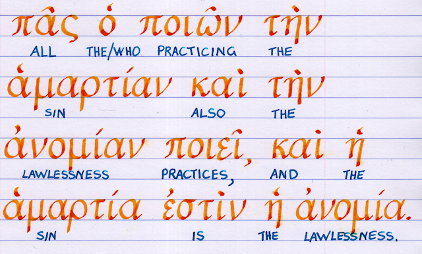What is Sin?
What is Sin?
The book of First John contains some important information all followers of Yeshua (Jesus) should know.
In the late first century, when John wrote this letter to the assemblies of the faithful, there was a pitched battle going on with false believers called gnostics, who split themselves away from the true believers, yet deceitfully claimed to be believers themselves. (See 1 John 2:18–19 which alludes to this juncture, calling it, “the critical moment,” or literally: the last or final hour).
The gnostics had a complex system of beliefs, the most extreme of which were eliminated from the Church when the gnostics were said to be “defeated”. Actually, they were not truly defeated, but merely became more subtle in insinuating their beliefs into the Church.
The gnostics hated the physical world (which they believed was created by another “god”), and therefore focused on what they touted as “spiritual” perfection. They rejected outward obedience to God’s Law, and argued for an invisible and impossible-to-prove inner perfection instead. (This is what the Catholic Church teaches to this day regarding “sanctification”, which is said to be an inner process and state of the “soul”—something which, of course, is not amenable to objective verification.)
Thanks to gnostics, the Christian Church lost the true knowledge and awareness of what, in reality, sin is. The majority of Christians today are indeed hard pressed to explain what sin is, and will resort to essentially stating that it is, “bad stuff,” and they will give examples like murder, theft, adultery, and so on. It is true that those things are, in fact, sins, but the essential definition of sin is lacking.
John the apostle tells us, instead, that sin is breaking God’s Law, just as the first man, Adam, did when he ate the fruit which God forbade to eat. This simple fact was, and still is, in danger of being lost, due to the battle being fought against gnostic heretics.
In 1 John 3:4, we are clearly told:
Everyone practicing sin also practices lawlessness, and sin is lawlessness.
Lawlessness is rejecting, ignoring, negating, abolishing, or otherwise turning a blind eye to and failing to practice the laws that God has set forth in Torah, which is essentially the Pentateuch, or the first five books of the Bible. Yeshua himself told us quite plainly that this is the Law all of God’s people must follow (see Matthew 5:17–20).
The Catholic and Protestant Churches have their own ideas about what lawlessness is, but these ideas do not square with a plain reading of Scripture and the very words of Messiah.

Figure 1: A word-for-word translation of 1 John 3:4.
Download
For offline reading or printing, you may wish to download the PDF version of this snippet.
- PDF: What is Sin?
- OpenPGP: Cryptographic Signature